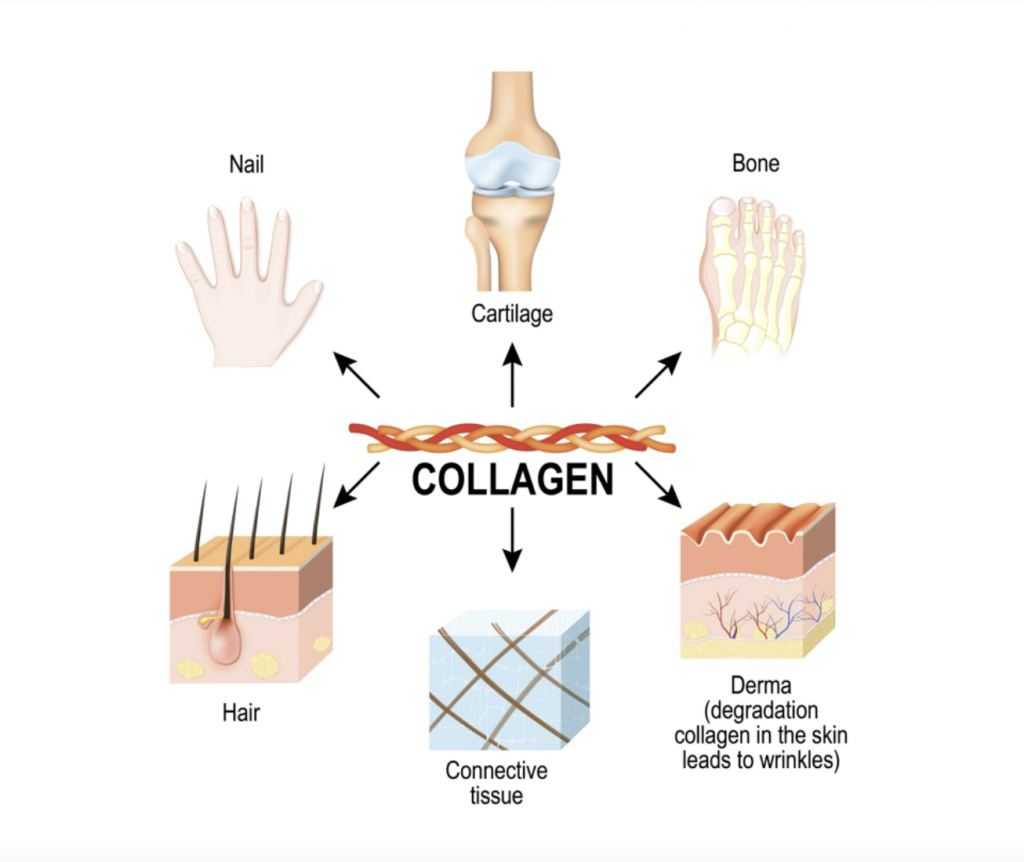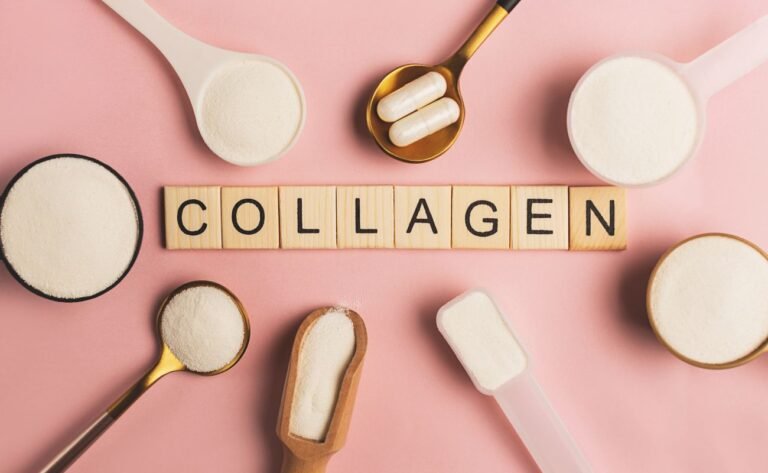I’m sure you’ve seen collagen everywhere by now. In creamers designed for coffee, in capsules, in bars, as on-the-go packs, even as an addition to your local smoothie bar. The main claims for taking collagen include helping with skin integrity, signs of aging, bone strength, and joint pain. Let’s take a deep dive to determine if the science supports these claims.

In your body
Collagen is a type of protein found in skin, joints, bones and connective tissue. The body produces less collagen as you age. As adults, we lose about 1% of our internal collagen per year, leading to thinner skin and more wrinkles. Smoking, UV exposure and processed carbohydrates (white bread, pasta, desserts) accelerate the breakdown of collagen.
In supplement form
Collagen supplements are derived from the parts of animals (usually cows, chickens and fish) that contain the most collagen: skin, bones and cartilage. There is no such thing as vegan or plant-based collagen, like plants do not produce collagen. If you’re taking something with this claim, you’re probably consuming a collagen “booster” that’s meant to help your body produce more collagen, but you’re not consuming the collagen itself.
To form a supplement, collagen molecules from animals are broken down by a process called hydrolysis (basically boiling) to make them bioavailable (easily absorbed).
The benefits
The benefits of collagen are hyped more on your IG and TikTok than in reality (oh, because companies and influencers are trying to SELL, SELL, SELL). The reality is that collagen “works,” but the benefits are mild to moderate.
Skin: studies (in humans) show that supplementing with hydrolyzed collagen can provide modest (7-20%) improvement in wrinkles. The amounts used in these studies vary widely – from as little as 0.5 grams per day to as much as 10 grams per day.
Joints: several preliminary studies have shown a modest improvement in joint pain and stiffness after 3-6 months of collagen supplementation. However, some studies have shown no benefit.
Building Muscle and Strength: Collagen is NOT a complete protein—so it should not be used as an exercise recovery or muscle building supplement. It is much better to get your protein from food or a complete protein powder like these.
Bone health: There is currently not enough evidence to recommend taking collagen for bone health.
My recommendations
I hate ruining my coffee with a collagen creamer (after that, some of my clients are really good with it). I don’t think it dissolves well enough and I want to enjoy my coffee when I drink it.
I also hated most powders that are meant to dissolve in water. They make the water slimy and weird. However, I’ve been loving it lately CB supplements (local Orlando company). I put a single-use, unflavored packet in my water and let it sit for 10-15 minutes until it dissolves, then drink it throughout the day when I’m at the office.
On non-office days, I take 2 of the TruNature Verisol capsules from Costco. They rated highly in third-party testing by Consumer Labs and are extremely inexpensive at $18.99 for 240 capsules.
Conclusion:
If you’re already paying an arm and a leg for botox, you might as well add a collagen supplement to your repertoire. It’s a fairly inexpensive way to improve the integrity of your skin, but you have to be consistent with use to see a difference. I think capsules are the most convenient, but some people enjoy collagen creams. Do not replace regular protein powder in your shakes or smoothies with collagen powder, as it is not a complete protein.
Sources:
Yay for non-clumping collagen supplements and better skin integrity!
We were not paid to review any of the above products. All opinions are our own. This post may contain contracted hyperlinks.
About the Author: Megan Poczekaj, RDN, LD, is a registered dietitian nutritionist in Orlando, Florida. He owns his private practice, Nutrition Awareness, where he teaches other entrepreneurs how to maximize their productivity and performance with nutrition. She is the author of the book The Optimized Life: A Nutrition Guide for Entrepreneurs and his co-host Nutrition Information Podcast.
If you need help losing weight, improving your performance or increasing your energy, schedule your initial consultation here. Not in Orlando but still need some nutrition tips? We also do online or phone consultations.
